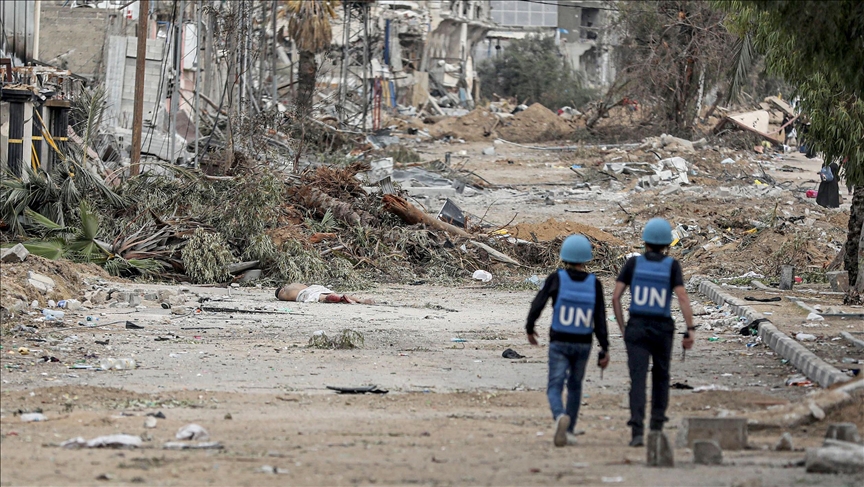WASHINGTON
The White House strongly disputed Monday Israeli Prime Minister Benjamin Netanyahu’s suggestion that there are “gaps” between the close allies on a proposal to end the eight-month war on Gaza.
Netanyahu reportedly told lawmakers earlier Monday that the three-stage proposal, as laid out by US President Joe Biden on Friday, “is incomplete,” adding that there are “gaps” between the plan and how the American president presented it to the public.
“The war will stop in order to bring hostages back, and afterward we will hold discussions. There are other details that the US president did not present to the public,” Netanyahu said, according to Israeli media reports.
National Security Council spokesperson John Kirby disputed the characterization, and repeatedly maintained that the plan is of Israel’s creation.
“It is an Israeli proposal,” he said, further maintaining that the president’s speech “was about laying bare for the public to see how well, and how safely, and how assertively the Israelis came up with a new proposal, how it shows how much they really want to get this done.”
“As for the gaps, I don’t know what gaps you’re referring to. I mean, I’ve heard different statements coming out of Israel. The Israeli foreign minister, himself, acknowledged that this was the Israeli proposal, that it was accurately, that it is the Israeli proposal. And we’re confident that it accurately reflects that proposal, a proposal that we worked with the Israelis on. So I know of no gaps to speak of,” he added.
The White House is “awaiting” Hamas’ official response to the plan after it was presented to the Palestinian group Thursday night, Kirby said.
“They ought to take the deal. This gives them what they’ve been looking for, which is a cease-fire, and over time, and through the phases, the potential withdrawal of Israeli forces from Gaza. So they ought take this deal. It’s it’s very forward leaning. And it’s good for the people of Gaza, good for the Israeli people. And they just need to move forward on it,” he added.
Hamas, for its part, said it will “respond positively to any proposal that includes a permanent cease-fire, a full withdrawal from the Gaza Strip, reconstruction efforts, the return of the displaced, and the completion of a comprehensive hostage exchange deal.”
The proposal, as laid out by Biden, envisions a three-phase agreement that would culminate with a multi-year process to rebuild the badly-damaged coastal enclave, and the return of all hostages, living and dead, held in Gaza.
The first phase would start with a six-week cease-fire during which a first round of hostages held in Gaza would be released, including women, the elderly and the injured, in exchange for the release of what Biden said would be “hundreds” of Palestinian prisoners. Israeli forces would also withdraw from what a senior Biden administration official called “densely populated areas.”
The remains of some of the hostages who have died would also be returned, and Palestinian civilians would be allowed to return to their homes and neighborhoods throughout Gaza, including in the north where Israel has implemented sweeping restrictions. Humanitarian aid deliveries would also scale up dramatically to reach 600 trucks per day, according to Biden.
Negotiators would seek to address outstanding issues during the six-week first phase, including the ratio of Palestinian prisoners that would be freed in exchange for the release of Israeli hostages. The proposal includes language allowing the cease-fire to be extended before the second phase begins so long as talks continue.
The prisoner swap ratio is a critical issue because in the second phase all living hostages would be freed, including all male Israeli military personnel. Israel’s forces would also fully withdraw from Gaza.
The final phase includes the commencement of Gaza’s reconstruction, which is estimated to take up to five years, and the return of any additional hostage remains still held in Gaza.
More than 36,400 Palestinians have since Israel began its war on Gaza eight months ago. The vast majority of the dead have been women and children, and over 82,600 others have been injured, according to local health authorities. The Hamas-led cross-border attack that precipated the current war led to about 1,200 deaths.
Vast swathes of Gaza now lay in ruins amid a crippling Israeli blockade of food, clean water, and medicine.
Israel stands accused of genocide at the International Court of Justice (ICJ), which in its latest ruling has ordered Tel Aviv to immediately halt its operation in the southern city of Rafah, where over a million Palestinians had sought refuge from the war before it was invaded on May 6.

